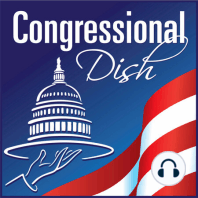70 min listen
CD079: The June Bills
ratings:
Length:
43 minutes
Released:
Sep 23, 2014
Format:
Podcast episode
Description
This episode highlights the laws and bills that passed the House of Representatives in June. Most of the bills this month were dedicated to cutting corporate taxes and keeping us hooked on fossil fuels. Laws S 1044: WWII Memorial Prayer Act The bill originated in the Senate, where it passed unanimously; it passed the House on June 23 by 370-12 and was signed into law a week later. A plaque will be installed at the Washington D.C. World War II memorial that says that President Roosevelt prayed on the morning of D-Day. The plaque will be privately funded. Written by Sen. Rob Portman of Ohio. No Republicans voted against it. HR 316: Collinsville Renewable Energy Production Act Allows the Federal Energy Regulatory Commission to reinstate a license for two hydro-electric projects in Connecticut and allows the license to be transferred to the town of Canton, Connecticut. Written by Elizabeth Esty, a Democrat from Connecticut. The bill passed unanimously in the Senate and was supported by every Democrat in the House; only three Republicans voted against it. It was signed into law on June 30th. Bills HR 4457: America’s Small Business Tax Relief Act of 2014 Makes permanent a four year business tax cut that allowed businesses to deduct up to $500,000 in property from their taxes. This is supposed to revert back to $25,000 in 2014. Adds things that can be deducted such as air conditioning, heating, and computer software. Eliminates some limits on what can be deducted. The amounts that can be deducted would increase yearly with inflation. The effects this bill would have on the budget would not be counted. Written by Rep. Patrick “Pat” Tiberi of Ohio. The bill passed with a vote of 272-144. HR 4453 S Corporation Permanent Tax Relief Act of 2014 Lowers the number of years that a kind of corporate income is taxable from ten years to five years. The effects this bill would have on the budget would not be counted. The bill passed 263-155 with the same two Republicans who voted against HR 4457 - Walter Jones of North Carolina and retiring Congressman John Campbell of California- voting against it. Forty-two Democrats said yes to this bill. The bill was written by Rep. David Reichert of Washington. HR 4413: Customer Protection and End User Relief Act Title I requires traders to have enough money to pay out customer bets and adds reporting requirements, but implements no punishment for non-compliance. Title II makes the Commodity Futures Trading Commission publish the costs and benefits of proposed regulations and creates a new Office of the Chief Economist within the Commodities Futures Trading Commission which has no specific purpose. The Commodity Futures Trading Commission could taken to court by a person - or corporation - that doesn't like their rules. The court can overturn the rules. Exempts some swaps gamblers from having to set aside money. Classifies fewer gamblers as "financial entities", which would effectively exempt them from some regulations. These changes are retroactive to July 21, 2010 (the effective date of the Dodd-Frank financial reform law). Walter Jones of North Carolina was the only Republican to vote against this bill (John Campbell didn't vote) and 46 Democrats joined the rest of the Republicans to pass it 265-144. The White House didn't issue a veto threat but said they "strongly oppose" the passage of this bill. It has little chance of becoming law. Written by Frank Lucas of Oklahoma. HR 3301: North American Energy Infrastructure Act Gives the Secretary of State, instead of the President, the authority to approve cross-border oil pipelines and forces them to make a decision within 120 days of the final environmental impact statement. No permit will be required to modify existing cross-border oil or gas pipeline. Allows the export and import of natural gas to Canada and Mexico without approval by the Federal Power Commission, which is required now. Allows the United State
Released:
Sep 23, 2014
Format:
Podcast episode
Titles in the series (100)
CD020: Continuing Resolution, Part 2: Part 2 of the Continuing Resolution which funds the government until September 30th. In this section, we look at the funding for the Defense Department and the Department of Homeland Security. B= Billion M= Million DIVISION C: DEFENSE DEPARTMENT... by Congressional Dish
